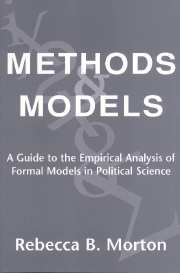2 - What Makes a Model Formal?
Published online by Cambridge University Press: 10 December 2009
Summary
There Are Many Different Types of Models
Political scientists, like all social scientists, use the term “model” frequently, but not always consistently; the same individual might use the term to mean different things in different settings. In order to understand the terms “model” and “formal model,” I first consider model building as part of the process of scientific inquiry.
The Scientific Process and Model Building
Observations about the Real World Suggest Research Questions
My presentation of the scientific process is idealized. In this ideal process, research begins with observation and experiments about the nature of the real world. One point of view is to think of the real world as being governed by a “data generating process” (DGP), that is, the source for the data observed about the real world. These observations range from the quite uncomplicated and simply described to the highly sophisticated in need of complex statistical study. The key is that the observation in some way reveals a question or problem about the real world (the data generating process) to be answered, something that a researcher does not understand and desires to understand. For example, a researcher may wonder why some ethnic groups live cooperatively in some jurisdictions but are unable to do so in others. Or, the researcher may observe that juries who must reach unanimous verdicts sometimes make decisions that seem obviously wrong to outside observers.
The observation may be coupled with some prior theorizing or model building that has not been successful or does not satisfactorily explain the observation.
Information
- Type
- Chapter
- Information
- Methods and ModelsA Guide to the Empirical Analysis of Formal Models in Political Science, pp. 33 - 74Publisher: Cambridge University PressPrint publication year: 1999
